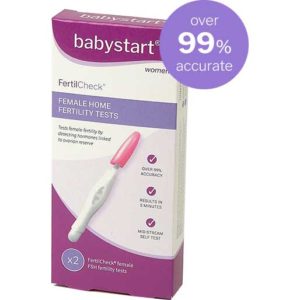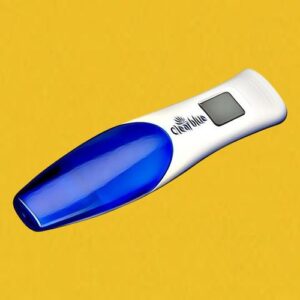When a woman’s periods stop and she is no longer able to get pregnant, she is said to have entered menopause. Before this time, her periods may have become less frequent in the preceding months or years. They then stop, sometimes suddenly, without warning.
The average age for reaching menopause is 51, but it varies from woman to woman and can start as early as your late 30’s or as late as your late 50’s. If you are experiencing the symptoms below it could be an indicator that you are beginning menopause.
- Mood swings
- Irregular menstrual cycles
- Night sweats
- Depression
- Forgetfulness
- Loss of sex drive
- Vaginal dryness
- Difficulty sleeping
These symptoms could also be related to other heath concerns so it is important to determine if they are indeed menopause. A fast and simple at-home menopause test kit can help you to determine if your symptoms are indeed menopause.
Menopause marks the end of your period. When you began menstruating your body made many changes leading up to the months before you cycle began, and it most likely took several months before your period became regular while your hormones regulated.
Menopause is very similar. Your body will begin to change in response to your changing hormones which leads to the symptoms you may be experiencing. Before your cycle comes to an end your periods will likely become less and less frequent. Once you are in menopause your eggs will stop producing ovaries.
What is Premenopause and Perimenopause?
Premenopause refers to the symptoms you experience when your hormones begin to fluctuate. These symptoms can begin while you are still experiencing regular menstrual cycles and are the first sign that menopause is starting. This could be when hot flushes, night sweats, and increased irritability begin.
Perimenopause is when your advanced symptoms of menopause begin and the occasional mild symptoms of premenopause become more apparent. Perimenopause is often when your period becomes irregular and when your Follicle Stimulating Hormone (FSH) levels increase. Symptoms of perimenopause can last for several years on each side of menopause.
How Does a Home Menopause Test Kit Work?
Home menopause test kits work by measuring the amount of FSH in your bloodstream. When you reach menopause you will have increased levels of FSH for the next 3-5 years. If you are trying to figure out if you have indeed had your last period and have moved into postmenopause, using a home menopause kit will help you in making this determination. Once you have determined that you have reached menopause you can speak with your physician regarding Hormone Replacement Therapy.
Stages of Menopause
Menopause is a gradual process that occurs in several stages:
- Premenopause: This stage encompasses a woman’s reproductive years, from her first period until the onset of menopause symptoms.
- Perimenopause: During this transitional phase, which typically begins in a woman’s 40s, the body starts producing less oestrogen. Perimenopause can last anywhere from a few months to several years. Common symptoms include irregular periods, hot flushes, mood swings, and sleep disturbances.
- Menopause: A woman officially reaches menopause when she has gone 12 consecutive months without a menstrual period. At this point, the ovaries have stopped releasing eggs, and oestrogen production significantly decreases.
- Postmenopause: This stage refers to the years following menopause. While menopausal symptoms may subside, women in postmenopause face an increased risk of certain health conditions, such as osteoporosis and heart disease, due to the lack of oestrogen.
Menopause Symptoms and Management
The symptoms of menopause can vary greatly from woman to woman, both in terms of severity and duration. Some women may experience only mild discomfort, while others may find their symptoms significantly disruptive to daily life. Common menopause symptoms include:
- Hot flushes and night sweats
- Vaginal dryness and discomfort during intercourse
- Mood changes, such as irritability, anxiety, and depression
- Sleep disturbances and insomnia
- Urinary tract issues, such as frequent urination or urinary incontinence
- Dry skin, eyes, or mouth
- Thinning hair or hair loss
- Weight gain and slowed metabolism
Fortunately, there are several ways to manage menopause symptoms and maintain overall health during this transition:
- Hormone Replacement Therapy (HRT): HRT involves taking oestrogen, often in combination with progesterone, to alleviate menopausal symptoms. However, HRT may not be suitable for everyone, so it’s essential to discuss the risks and benefits with your healthcare provider.
- Lifestyle changes: Adopting a healthy lifestyle can help manage menopause symptoms and promote overall well-being. This includes maintaining a balanced diet, engaging in regular exercise, managing stress, and getting sufficient sleep.
- Non-hormonal treatments: Certain medications, such as low-dose antidepressants or gabapentin, may help alleviate hot flushes and other symptoms for women who cannot or choose not to use HRT.
- Natural remedies: Some women find relief from menopause symptoms through natural remedies, such as herbal supplements (e.g., black cohosh, evening primrose oil), acupuncture, or massage therapy. However, it’s crucial to consult with a healthcare professional before trying any natural remedies, as they may interact with other medications or have side effects.
The Importance of Menopause Awareness
Menopause is a natural and inevitable part of a woman’s life, yet it remains a topic that is often shrouded in mystery and misinformation. By increasing awareness about menopause and its symptoms, women can feel more empowered to seek support, make informed decisions about their health, and navigate this transition with confidence. Remember, every woman’s menopause journey is unique, and there is no one-size-fits-all approach to managing symptoms. Don’t hesitate to reach out to your healthcare provider, friends, or family for guidance and support during this transformative stage of life.
There are various types of home menopause tests kits but they all work in the same way. At Zoom Baby we stock our own Menopause Test Kit which offers reliable results at a fraction of the price of some branded tests. We also offer the BabyStart Fertility Test Kit which is a bit more expensive, but equally as popular.
Photo by Matthew LeJune on Unsplash
Zoom Baby is a leading supplier of Pregnancy Tests and Ovulation Test Kits






